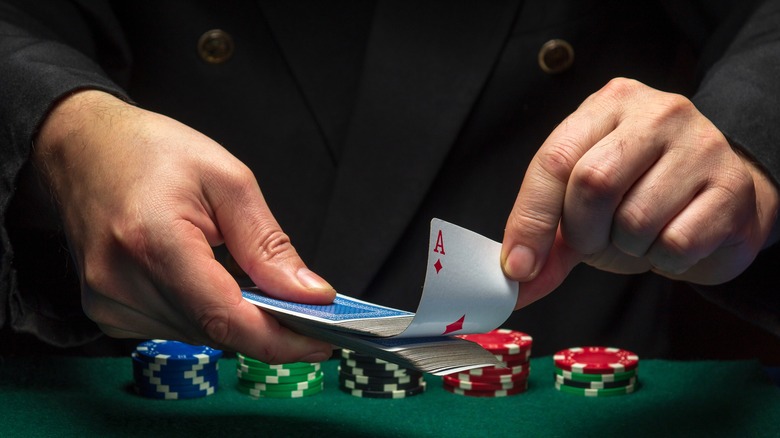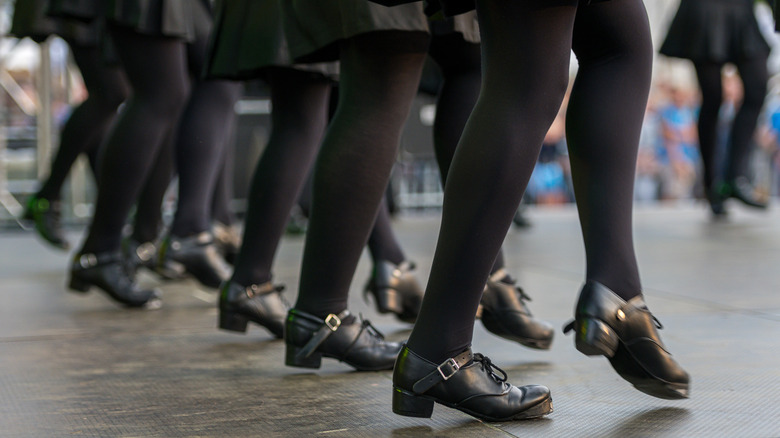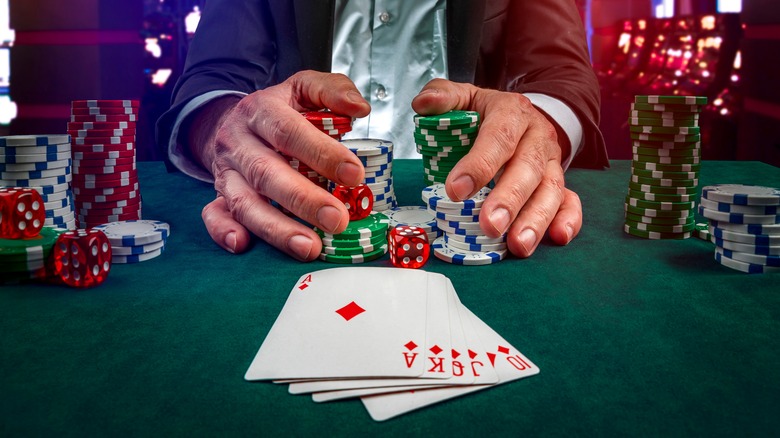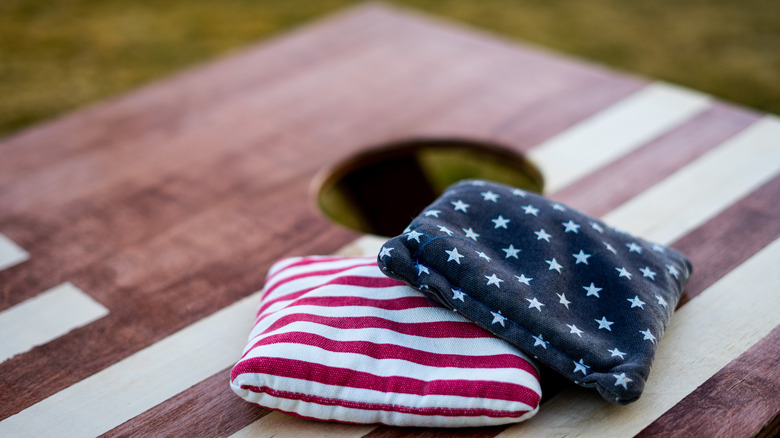Egregious Tournament Cheaters Who Got Caught
When one is really, super-good at something, there can be a natural inclination to put their skills up against others who are similarly awesome, just to see if they can hang — or, better still, if they can dominate. There are tournaments to be found for virtually every skill set and discipline, and competition can be a healthy thing; it helps us to test our boundaries and limitations, to expand our knowledge and skills, and ultimately, perhaps, to know ourselves better. That journey of self-discovery, however, can sometimes lead to the knowledge that you are a dirty, scheming cheater.
For every good sport willing to put their skills on the line against the best of the best in their chosen field, there is at least one terrible, awful sport who just wants to stand in the winner's circle, sportsmanship be damned, and will do whatever it takes to make that happen whether they deserve it or not. Now, they say that cheaters never prosper, and while that is totally not always true (they do prosper, early and often), the ones we'll be looking at today proved that sometimes, the adage does hold. They came, they saw, they cheated, they conquered — and they got busted like a toy from the dollar store.
Fishing tournament cheaters Jacob Runyan and Chase Cominsky get busted on camera
Every fall, anglers from Ohio and the surrounding areas gather on Lake Erie for a contest to see who can catch the biggest, baddest walleye, and the competition can be fierce. Fishing tournaments are no joke; one can make a decent living if one is super-dope at fishing, which competitors Jacob Runyan and Chase Cominsky knew quite well. The pair were on a hot streak leading up to the Lake Erie Walleye Trail tournament, which paid out a grand prize of $28,760. As the participating anglers were having their catches weighed, it looked like Runyan and Cominsky would once again make off with the grand prize — but tournament director Jason Fischer (no, really, that's his name) noticed that their catches seemed a bit heavy for their size.
In a video that went stupidly viral (which is NSFW, for reasons involving lots of profanity), the would-be champions stand by helplessly as judges cut open their catches — discovering that they contain lead weights, which are not known to occur naturally in walleye. Judging by the reactions of their fellow anglers, it's a small miracle that the pair made it out of there without having the snot beaten out of them — but in the months that followed, the legal system went ahead and did that, metaphorically speaking. The cheaters were stripped of their fishing licenses for three years and spent 10 days in jail and a year and a half on probation, and Cominsky was forced to fork over his (very expensive) boat, since it was used in the crime.
Irish dancing is a surprising hotbed of scandal
We've all seen Irish dancers at least a time or two; you know, the ones who dress in kilts and really uncomfortable-looking shoes, and keep their upper bodies stock-still while doing things with their feet that seem to defy the laws of physics. It's a quaint, old-timey activity that is also apparently quite cutthroat on the competitive circuit, as a series of recent scandals have illustrated.
In 2022, The Irish Times reported on records filed with Ireland's High Court that outlined a broad culture of hardcore cheating in the Irish dancing community. The Irish Dancing Commission, it seems, had received intel that several instructors were colluding with judges to arrange favorable treatment for certain competitors, and even to fix entire competitions — and they were doing so by text message, thereby brilliantly leaving a bright, honking digital paper trail broadcasting ironclad evidence of wrongdoing. In perhaps the most egregious example, a male instructor and a male judge were busted very specifically laying out an arrangement whereby the latter would award a certain student stellar scores in exchange for favors of the hardcore sexual variety from the former, in a text convo peppered with cute emojis and eye-wateringly explicit language. The blow-up resulted in a new set of adjudicating rules being implemented by the Commission, which are quite unsurprisingly focused on limiting digital communications between the judges and outside parties during competitions.
Golfer Justin Doeden was not up to par
In June 2023, up-and-coming golfer Justin Doeden had just finished up his 18 holes at the Ottawa Open and turned in his scorecard when some members of his group noticed that something was amiss. According to said scorecard, Doeden had just squeaked inside the cutoff of 60th place for the second round of the tournament, scoring a 3-under. This didn't quite sit right, as they were pretty sure Doeden had double-bogeyed on the final hole, a par 5, which would have put him out of contention. They notified tournament officials, and upon examining the card, lo and behold — that score of 7 on hole 18 had magically been replaced with a 5. While the officials were conducting this presumably brief investigation, Doeden quietly withdrew from the tournament — and in a since-deleted tweet the following Monday, he fessed up.
"I am here to confess of the biggest mistake I have made in my life to date. I cheated in golf," Doeden wrote (via Golf.com). "This is not who I am. I let my sponsors down. I let my competitors down. I let my family down. I let myself down. I pray for your forgiveness." Doeden's little alteration was particularly cold-blooded because, if the phony score had stood, all of 13 golfers would have finished tied for 61st — and gotten knocked out of contention not by Doeden's skills, but by his pencil. As of this writing, it's still not clear if the PGA levied any penalty or fine against Doeden.
Cal State cheerleaders get by with a little help from their friend
The 2011 National Cheerleading Association Collegiate Championships was a display of utter dominance by one squad: the Cal State Long Beach 49ers, who tossed, flipped, and cheered their way to glory. The squad took home the national championship trophy, but there was a little snag. You see, the NCA has simple but clear guidelines for who is allowed to compete, having to do with the number of hours of coursework one must be in enrolled in, depending upon whether or not one is an undergraduate, graduating senior, or graduate student. The reason these details are relevant is because the 49ers won their title with help from a male member of the squad who was enrolled in exactly zero hours of coursework, because he was no longer a student.
A 49ers official recognized the dude, and it was determined that the entire squad — up to and including coach Eric Anderson, a winner of 30 national championships over his career, and the 49ers' coach for the last decade — had been fully aware of his ineligibility, but had chosen to keep their lips zipped in pursuit of that trophy. Their possession of it was short-lived; the squad was forced to forfeit their title, and Anderson was summarily canned.
Osceola High School cheer squad cheats their way to victory
It may surprise you to know that there has been more than one cheating scandal in the squeaky-clean sport of cheerleading, and an egregious instance of enlisting outside help to win a big, fat trophy took place back in 2002. In a statewide competition in Florida that year, Osceola High School took home the title, winning themselves a 5-foot trophy (we told you it was big and fat) and bragging rights for, oh, as long as it took officials to figure out that there was a guy on the team who wasn't supposed to be there. His name was Adrian Free, and he wasn't a former Osceola student; he didn't even attend a neighboring school. This particular dude was a senior at Ocean Springs High in freaking Mississippi, which doesn't even share a border with the Sunshine State.
An investigation determined that Osceola coach Kerri Collins had cleverly directed Free to enroll at Osceola before the tournament, but Free had not-so-cleverly failed to do so. Osceola was stripped of their title and forced to hand over their trophy (or perhaps wheel it over on a dolly) to the second-place squad, from Bowling Green High in Kentucky; Collins, who had just months earlier won a High School Coach of the Year award, resigned her post.
Poker champ Martin Kabrhel called out for cheating
There are high-stakes tournaments, and then there is the World Series of Poker, where competitors have to be flush with cash just to buy in for the chance to lose it all. In June 2023, pro player Martin Kabrhel ponied up a quarter-million dollars to buy in to the Super High Roller No-Limit Hold 'Em event, an act that would make anyone feel like a complete badass; he finished in third place and won $2.3 million, which would make anyone feel like a super badass. According to fellow competitor Andrew Robl, though, Kabrhel had a secret — a dirty, totally non-badass secret.
Robl called Kabrhel out on X (formerly Twitter) in the middle of the event. "How is Martin Kabrhel not banned from the WSOP?" he tweeted. "He makes any tournament no fun for anyone and on top of it I've seen him mark cards in every tournament I've ever played with him." Robl followed that up with another post, this one an image of Kabrhel appearing to engage in shady activity during the competition, with the accompanying text "Reading his card markings or is he just using his X-Ray vision superpower?" Kabrhel categorically denied the allegation, but the WSOP opened an investigation that is still ongoing as of this writing, saying in a statement that it is "taking these allegations very seriously."
Call of Duty tournament player fragged by the judges
Video game tournaments can be pretty lucrative, even on the amateur circuit. The amateur circuit for the tournament league of the uber-popular FPS "Call of Duty" is known as "COD Challengers," and each season can have a prize pool in the neighborhood of $150,000 to $250,000, which is a pretty upscale neighborhood. In 2023, a match between Team OMiT and Team Orbit, the latter of which included former pro player Bryan "Jimbo" Sabman, went off the rails when Sabman drew himself a ban right in the middle of the match. In a since-deleted tweet (via Dot Esports), Sabman insisted that this was meritless, and that tournament sponsor Activision had told him the ban would be reversed. This was, well, a bunch of malarkey.
Not only was Sabman's ban not lifted, but his entire team was forced to bow out of the tournament after it was found that Sabman had employed hacks to give himself, and thereby his team, a distinct edge in the competition. While it was never made clear exactly what type of hacks he used, it has been demonstrated by streamers — like one known as "Boricua Rage Gaming" — that a COD player can endow themselves with such augmentations as improved aiming and the ability to see other players' stats and enabled weapons, all under the noses of the game's developers (via Dexerto). Team Orbit tweeted their dismay for the other players in response to the situation, while one of those players known as GRVTY succinctly posted, "All our reputations are completely tarnished."
Kenyan chess tournament participant makes the wrong move
Kenyan women's chess tournaments are not ordinarily rife with treachery (we assume), but in 2023, one player in the women's portion of the Kenyan Open — who registered under the name of Millicent Awuor — immediately drew the attention of officials. This individual completely dominated their first two matches, even demolishing a former national champion, before losing to Uganda's highly rated Ampaira Shakira in the third round. Still, "Awuor" qualified to move on — but after the fourth round, the player was pulled aside by officials on account of a slight case of being a dude.
"Awuor" had managed to slip through by wearing a niqab, which completely obscured his face except for his glasses, and literally not speaking to anyone for the duration of his participation. For the first few rounds, officials were wary of raising any suspicion, as forcing an Orthodox Muslim woman to remove her headwear is a huge no-no, a fact of which "Awuor" was certainly aware. But when fellow players and officials began noting the player's odd, masculine gait and the fact that they wore shoes specifically made for guys, they called foul. The player, who was not named, was a highly rated international competitor who, he said, simply needed the prize money, which would have equated to about $4,000 USD for first place. Rather than a payday, though, he earned himself a three-year ban from competition and a place in the Kenyan Women's (or maybe Men's) Chess Hall of Shame.
Cornhole league shaken by BagGate
In case you are unfamiliar, cornhole is a game played with two slanted boards with a hole in the middle; players toss beanbags at the boards, and are scored for landing near the hole, or actually making it through. (That is the only meaning of the word, there are no others at all.) Tournaments are sanctioned by the American Cornhole League, which may be growing a bit too quickly for its own good. Rules and regulations have begun to prove difficult to monitor and enforce, as exemplified by a snafu at the game's World Championships in late 2022 that came to be known as "BagGate."
It began when doubles competitor Devon Harbaugh called for a bag check on his opponents, the No.1-ranked team of Mark Richards and Philip Lopez, believing their bags to be too thin. Upon inspection, the bags indeed failed to pass muster — but then came a twist worthy of M. Night Shyamalan, but slightly less freaky. Richards and Lopez in turn called for a bag check on Harbaugh and his partner — and their bags also failed the check. After briefly debating what the heck to do, officials were unable to determine conclusively that either violation was intentional, and the match simply went on. ACL President Eric Marvin told The Wall Street Journal that due to instances like this, there are soon to be "some big shifts and movements in the infrastructure of the sport," a statement which contains no double entendres whatsoever.
Billionaire Larry Ellison can't buy honesty
Billed as the oldest trophy in international sporting, the America's Cup has been awarded to the dopest yacht racing team on the seven seas since 1851. In 2003, super-billionaire Oracle co-founder Larry Ellison did what super-billionaires will do, and created Oracle Team USA with the intention of bringing home that big old trophy. The team accomplished that in 2010, but in 2013, during the "World Series" lead-up to the America's Cup, the team hit a snag on their way to yachting glory when it was found that their yacht had been modified with improperly placed weights, which would have given them a distinct advantage. In response, the team was slapped with the harshest penalties in the history of the sport: they were docked one point for each match in which the modified yachts were used and fined a quarter-million dollars, and three members were kicked off the team.
Of course, Ellison was quick to wipe the egg off his face in grand style when it came time to race for the 2013 America's Cup. Down 8-1 late in the series, Team Oracle won eight straight races to claim the cup over Emirates Team New Zealand, completing the greatest comeback the race had ever seen — heck, it's even been called the greatest comeback in sports history.
Toyota employs Schroedinger's Turbo in World Rally Championship
The Toyota Celica, that old-school, sort-of sporty coupe of the type your middle school best friend's stepmom drove, may not seem like much — but there was a time in the '80s and '90s when souped-up versions of the vehicle dominated on the rally car circuit. Sports involving complex mechanics, though, leave a lot of room for clever cheats — and in 1995, the Toyota racing team devised what may have been the most clever rule-busting modification in rally car history.
The cheat, without getting too gearhead-y about it, involved a turbo that, when uninstalled from the vehicle and examined on its own, appeared to be a completely regulation part. The act of installing it, though, activated a hidden mechanism that changed the configuration of a plate within the part that was there to restrict airflow, opening it up by a scant 5 millimeters — enough to nudge up the overall output of the engine by up to 50 horsepower. Somehow, the modification came to the attention of officials; to this day, it's not known how, although it seems clear that someone inside the Toyota team must have blown the whistle. But the cheat was so elegantly executed that it has become the stuff of legend, even though the team was disqualified; even Max Mosley, the president of governing body FIA, reportedly called it "the most ingenious thing I have seen in 30 years of motorsport."
DJ Cheatmaster Cheat busted for cheating at Red Bull's 3Style
Red Bull's 3Style is billed as "the world's largest global DJ competition," and since 2010, it has hosted some of the best to ever stand behind the turntables. In 2016, though, controversy struck the competition. The Australian version of the event was won by DJ G Smooth, who blew away the judges with a technique known as a "roll," in which triggering pads on the mixer induce a drum roll-type effect on the record being played. G Smooth's speed and precision on the technique was impressive, indeed — and not long after his victory, DJs who caught clips of the performance online began pointing out that it also appeared to have been faked.
In the clip, it is pretty evident that G Smooth is miming at least that portion of his routine to a recorded track, as the motion of his hands simply don't line up with the sound; it was also noted that some of the settings on his mixer appeared to be a bit off, with the volume gains on his turntables down low while the mixer's onboard sampler was pumped up. G Smooth had his victory nullified, and while he insisted in a Facebook post that he had performed the entirety of his set live, it's tough to believe that the video is lying.












